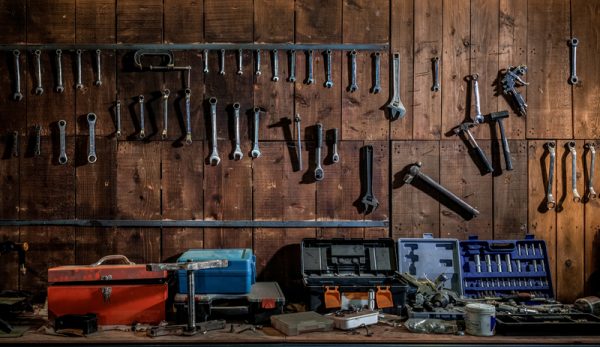
Farm tools are important to have on hand. Basic tools will enable you to fix more than you think and leave the big jobs up to the professionals. Here are some tools you’ll need to do everything from changing your tractor’s oil to replacing a radiator hose on your farm truck.
Combination Wrenches
Beginning with the absolute basics, you’ll need a set of combination wrenches—or, preferably, two sets: one metric and one standard (or “SAE”).
Standard fasteners tend to hold together domestic machinery. Metric ones, on the other hand, are common in foreign-made parts.
For those uninitiated into the world of wrenches (which can be a surprisingly confusing place), combination wrenches are open on one end and closed on the other. The open end of the wrench is perfect for fitting into tight spaces. The closed (or “boxed”) end of the wrench, on the other hand, fits over the entire nut or bolt, giving you a more reliable hold.
Read more: Fill you wagon with farm tools to make common tasks easier.
Socket Set
Although combination wrenches may seem like all you need, they’re almost certainly not. Socket wrenches are another indispensable item in your arsenal of farm tools.
Unlike most combination wrenches, socket wrenches have a ratcheting head. This means that you can effectively work on a fastener in tight spaces while only moving the wrench itself a few degrees.
It’s also worth investing in some extensions for whatever socket set you buy. Extensions are especially helpful when you’re working on an engine, where important bolts have a habit of being 6 inches below your reach.
(A Bunch of) Pliers
Like wrenches, pliers come in all shapes and sizes, and you’ll use many of them. To begin with, consider purchasing a variety set.
Needlenose pliers are essential for working in tight spaces and installing the spring hose clamps found on tractor and automotive lines.
Channellock pliers, on the other hand, allow you to establish an especially tight grip. I frequently use them to keep the head of a bolt secure while removing a nut from the opposite side.
Torque Wrench
Yes, another wrench. This one is a bit different, though.
A torque wrench is a specialized type of socket wrench that allows you to measure the amount of torque used to tighten a fastener. So what is torque? It’s essentially the amount of tension on a nut or bolt, which is a kind of proxy for how tight the fastener is.
In most machinery, each nut or bolt is designed to be tightened to a particular torque. The lug nuts on my truck should be tightened to 105 ft-lbs, for instance, whereas the shock mounts should be tightened to 155 ft-lbs.
Without a torque wrench, you’re essentially flying blind and will never know how tight (or loose) your bolts really are.
Read more: Keep your instruction manuals—and keep them organized.
Repair Manuals
Although owner’s manuals are a great source of information for technical specs, they don’t provide detailed instructions for individual jobs. That’s where a repair manual comes in.
Repair manuals are just what their name suggests: manuals that walk the user through the most common repair and maintenance tasks.
You can usually find a YouTube video covering a lot of the same jobs. But repair manuals are professionally written and don’t stray off-topic nearly as much.
This list of tools is far from comprehensive, but hopefully it will help you get started making some of your own repairs on the machinery around your farm.
This article about farm tools was written for Hobby Farms magazine online. Click here to subscribe.




